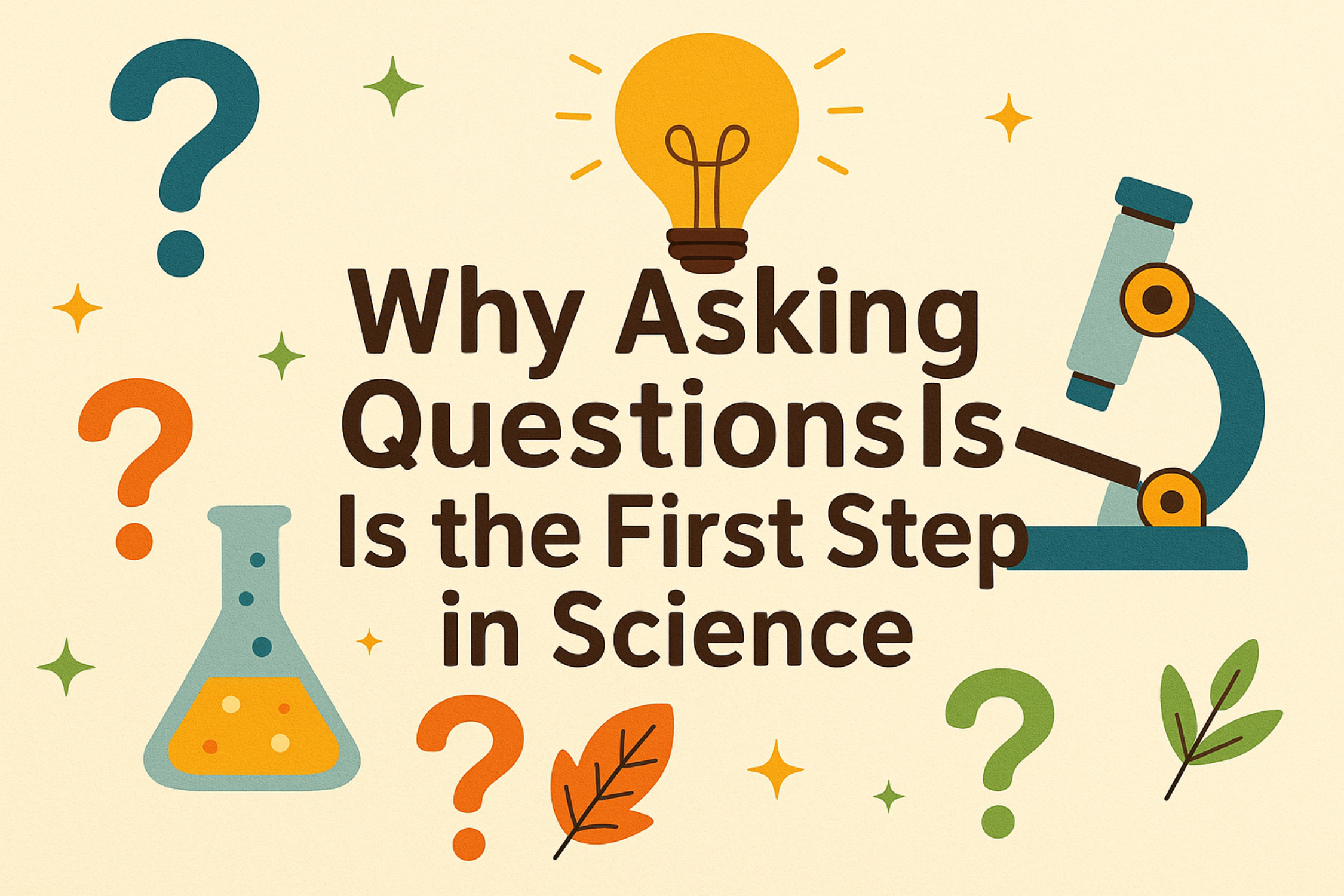Science is not just about numbers, formulas, or big laboratories. At its heart, science begins with curiosity. And curiosity always starts with one simple thing: a question. Whether it’s a child wondering why the sky is blue or a scientist trying to understand how a virus spreads, questions are the beginning of every discovery.
What Is Science?
Science is the study of the world around us. It helps us understand how things work—from tiny atoms to giant planets. It is a tool that helps us explore nature, health, space, animals, and even our own bodies. But none of this learning happens unless someone asks, “Why?” or “How?”
Without questions, there is no search for answers. That is why asking questions is the very first step in science.
The Power of a Simple Question
Have you ever watched something and thought, “I wonder why that happens?” That moment of wonder is where science is born. Even the biggest inventions and discoveries began with a simple question.
Here are some real-life examples:
- Isaac Newton saw an apple fall and asked, “Why does the apple fall down and not up?” That question led to the discovery of gravity.
- Galileo Galilei looked at the stars and asked, “What are those lights in the sky?” His questions helped build the foundation of modern astronomy.
- Jane Goodall asked, “How do chimpanzees behave in the wild?” Her questions led to amazing discoveries about animals.
Each of these people asked questions that many others might have ignored. But because they were curious, they looked for answers. And in doing so, they changed the world.
Why Questions Are Important in Science
Asking questions is not just important—it’s necessary. Here’s why:
1. Questions Guide Our Thinking
When you ask a question, your brain starts looking for answers. You begin to observe more carefully, think deeper, and pay attention to small details. This is exactly what scientists do.
2. Questions Lead to New Ideas
Sometimes, asking one question can lead to more questions. This creates a path of discovery. You might not find the answer right away, but you might find something even more interesting.
3. Questions Encourage Learning
Learning is easier and more fun when you’re curious. When you’re asking questions, you are more likely to enjoy reading, experimenting, or exploring.
4. Questions Help Solve Problems
Science solves real-life problems. From medical treatments to better technology, it all begins when someone asks, “How can we fix this?”
How Questions Become Scientific Investigations
Let’s take an example. Imagine you see some plants growing faster than others in your school garden.
You might ask:
“Why are these plants growing faster?”
From there, a science process begins:
- Ask a question: Why are some plants growing faster?
- Make a guess (hypothesis): Maybe those plants get more sunlight.
- Test your guess: Measure how much sunlight each plant gets.
- Record your findings: Take notes every day.
- Learn from it (conclusion): You discover sunlight helps plants grow faster.
This is how science works. A simple question turns into an experiment, which leads to a discovery.
The Role of Questions in the Classroom
Many students feel shy about asking questions in school. They think it shows weakness or that they don’t understand something. But in science, asking questions is a strength.
Teachers Should Encourage Questions
Teachers can create a friendly environment by:
- Telling students that all questions are welcome.
- Giving time to ask and discuss questions.
- Praising students who show curiosity.
Students Should Ask Freely
Students can become better learners by:
- Writing down any question that comes to mind.
- Asking during lessons or after class.
- Talking to friends or family about their questions.
How to Ask Good Science Questions
Not all questions are the same. In science, questions need to be clear and based on things we can observe or test.
Here are tips to ask better questions:
- Focus on what you see or wonder about.
- Use words like “how,” “why,” or “what.”
- Try to make the question simple and specific.
- Think if you can test or research the answer.
Some examples of good science questions:
- Why does metal feel colder than wood?
- How do clouds form?
- What happens if we don’t water a plant for a week?
- How do ants find their way back home?
From Questions to Scientific Discoveries
Many important discoveries started with simple questions:
- Louis Pasteur asked: Why do people get sick from certain foods? His research led to the process of pasteurization, which keeps milk safe.
- Alexander Fleming wondered why bacteria stopped growing near a mold in his lab. That question led to the discovery of penicillin, a life-saving medicine.
- Rachel Carson asked how chemicals affect birds and animals. Her questions helped start the modern environmental movement.
These discoveries saved lives, improved health, and protected nature. All of them started with one thoughtful question.
Why We Should Keep Asking
Even in our daily lives, asking questions can make us better thinkers and problem-solvers. If something breaks, we ask: “How can I fix it?” If we feel tired often, we ask: “Why am I feeling this way?” If we care about the environment, we ask: “What can I do to help?”
Asking questions helps us understand ourselves, others, and the world.
Final Thoughts
Science is not just a subject in school. It is a way of thinking and understanding the world. And the first step in that journey is asking questions.
You don’t need to be a genius or wear a lab coat to be a scientist. You just need to be curious. Every time you ask a question, you open the door to learning something new.
So, never stop asking. The next big idea could start with your question.




